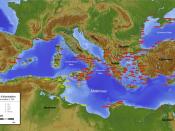Between 800 and 750 B.C. a major colonisation movement began that for 200 years carried Greek settlers to new homes along the Mediterranean and into the Black sea region. Colonisation began as Greece emerged into the Dark Ages period following the disintegration of the Minoan and Mycenaean civilisations, and was the product of a broad range of political and social disputes, an increase in population and land shortage and commercial interest. Greek colonies were not interested in conquering and living among native populations, they wanted the new settlement for themselves. The colonisation movement had many positive and negative results, as the Greek political system changed from monarchy to aristocracy, the hereditary system of land ownership was broken down, also trade created great wealth and a new middle class. Colonisation also had many cultural effects as the Greeks learned techniques from the Egyptians as well as the Phoenicians and from the people of Lydia.
Political strife was a common feature of life in most Greek city-states at this time. There was competition for leadership among the noble families and this often led to a disaffected noble taking the initiative, leading a group of colonists to a new settlement (Bradley). Most city states were ruled by aristocrats and at first they ruled well, however overtime they governed to their own benefit. They were totally impervious to the needs of others as they jealously guarded their power (Herodotus). The aristocrats often resorted to violence against the lower classes. The ancient historian Aristotle can sustain this where he highlights that "there was civil strife between the nobles and the people for a long time". The aristocrats supported the sending out of colonist as a way of eliminating difficult citizens who were dissatisfied with their rule. This is clearly acknowledged by the modern historian Bradley...



Ancient Greece Why did the ancient Greeks Colonise
Good paper very informative, be careful using the word "This" in the begin of a sentence.
0 out of 0 people found this comment useful.